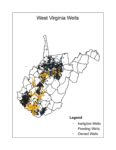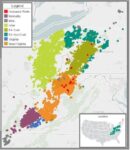INFORMATION FOR “FIELD TAP” CUSTOMERS WHEN GAS PIPELINES GET ABANDONED.
Introduction.
This issue is not to be confused with “free gas”. Free gas is what some surface homeowners get when there is a gas well on their property and if the drilling lease of the minerals to the driller included free gas for one (usually) residence on the property. “Field taps” (also often called “Farm taps”) do not hook to wells, they hook to pipelines.
The gas from a well has to get to market though pipelines. The smaller pipelines leading from each well are usually called “gathering” lines. Those lines converge into larger “transmission” lines which go to distribution companies like Hope and Mountaineer Gas. The distribution companies purify and odorize the gas and send it through “distribution” lines to residence and business customers. These distinctions are often not so clearly divided in the field. Sometimes the companies that own the transmission lines will allow rural folks to tap into those lines, set up a meter, and buy gas from the transmission lines (or even sometimes from the gathering lines). So there are people in rural areas that get gas from transmission lines rather than distribution lines.
The problem is that the gas in these gathering and distribution lines fading away. These lines are fed by conventional vertical gas wells all over the state. All gas wells put out most of their gas in the very early years of their existence and then, at one rate or another, decline gradually for a long time before not producing enough to use. In the past the gas from older wells with fading gas was replaced by gas from newly drilled conventional vertical wells. In 2017 there were about 2000 permits for such wells drilled. In 2003, only 9 for conventional vertical wells! Why the decrease? The new Marcellus and Utica Shale, horizontal, large-volume-frac’ wells are being drilled only in the northen and north-central parts of the State. There are about 200 of those drilled each year, and each one produces 60 times the gas of a conventional vertical well. The horizontal shale wells produce gas in higher pressures, and higher volumes, and in bigger pipelines that are not amenable to field taps. Even more significantly, they are not near most of the same farms etc. with current field taps. So the gas in the pipelines is fading as the production from the conventional wells fades, and this is causing lots of problems for rural customers who have field taps.
In addition many of these gathering and transmission lines have not been properly maintained. Natural gas customers expect their gas service to last forever. But if you are getting gas from a driller/operator who knows his conventional wells will not last forever, there is not much incentive to go out and inspect and maintain the pipelines to those wells that will eventually fade out.
Many of these field taps are on transmission lines that have become regulated by the West Virginia Public Service Commission (“PSC”). However, some of them are not. We will discuss the issues of these two different sets of field taps below.
Field taps on PSC regulated pipelines.
In 2019 the Public Service Commission that regulates monopolistic utilities in West Virginia (the “PSC”) opened a “general investigation” into issues for customers with field taps. WVSORO generally does not follow what the PSC is doing because there is a Consumer Advocate division of the Public Service Commission that does a pretty good job, and because the PSC regulates so many utilities. However, this aspect very directly affects our members.
WVSORO participated in that 2019 investigation by pointing out that there are many different field tap/pipeline situations with different problems and different potential solutions, and will be for at least for a few years. Potentially a driller could be incentivized to drill a new conventional well to service a potentially abandoned pipeline if the driller was promised a certain rate (higher than market rates from horizontal shale wells) for the purchase of gas, and if the line was not in too bad shape. Some pipelines may have leaks that were not noticed when the conventional wells were still producing large amounts of gas, but could be making a difference now if those leaks could be found and fixed – though this is not a permanent solution without new wells. Similarly the operators of the current wells might not have been maintaining the wells and they could be “swabbed” and production improved.
The PSC has apparently adopted that approach and required companies who are providing field taps to apply individually for abandoning lines the PSC regulates.
Current Hope Gas PSC proceeding.
Hope Gas is a distribution company providing gas service to individual homes and businesses. However, it recently also acquired the pipelines of two purely transmission companies, Equitrans and Dominion. It evaluated all of its new pipelines to determine if they all made sense to continue to serve field tap customers on all of the lines. It acquired lines with 14,800 such customers. It determined that 479 of those customers were on pipelines that are unsafe/unreliable/uneconomical and Hope wants to abandon those pipelines. So Hope asked the PSC for permission to do so. That is the bad news for those 479 folks.
But there is good news. Hope has agreed to approach those customers and offer to convert their natural gas appliances to burn propane, and supply them with a propane tank, and offer to begin providing them with propane at the same rate at which they have been receiving natural gas. In the alternative, if the customers requested conversion to electricity, Hope would give them new electric appliances, but it would be up to the customer to find an electric supply.
WVSORO applauds this result. It is unfortunate that the natural gas supply from old wells and pipelines if often no longer viable. But Hope should be congratulated for offering to make these conversions, and to substitute propane at regulated prices for those who choose that result. We were first concerned that charging by a price calculated per MCF (thousand cubic feet) of volume of natural gas might not provide the same heating BTU’s as natural gas, but we are assured that propane has, if anything, more heating value that natural gas. We were also concerned that Hope might balk at the cost of conversion to electric heat pump furnaces and other electric appliances plus even higher amp electric residential service breaker boxes and new service to the pole for those who could not, or did not want, to change to propane. Early indications are that these will not be problems.
So as this is written, WVSORO plans to comment favorably on Hope’s proposals to the PSC – with those conditions!
Field taps that are not on regulated pipelines.
Many times field taps are placed on pipelines of transmission or gathering line companies that are not otherwise regulated by the PSC. On occasions a pipeline of a company has enough customers on it, and customers complain to the PSC enough, that the PSC steps in and has regulated what would otherwise not be a regulated company. But there are lots of examples of the pipeline/owners providing field taps that are not being regulated by the PSC. In that case the customer will not have help from the PSC when a pipeline is abandoned. What can that customer do when the pipeline owner shuts in the well that was suppling the gas to a pipeline or abandons a pipeline for some other reason. And this may happen more often as we become conscious of how much leaking methane from pipelines may be affecting the environment and government steps in.
There are two options if that happens to you as a customer. Raise heck or be nice and sympathetic. The customer can ask the pipeline’s owner to give you propane conversion kits for your natural gas appliances. If the company is making enough money on its other pipes or enterprises, it might do so voluntarily if you ask nice.
The other option is to raise heck. Particularly if there are a number of neighbors in the same fix, it is worth a try to get the PSC to intervene. so let the company know you are going to try that. Or if the company is sensitive to its public image, take your plight to the local newspaper.
Getting the pipeline owner to put you back on or do some work on the line or well might get you back on line for a while. However, you might focus instead on assistance for conversion to propane or electricity for longer term benefit. That will still not probably put you in as good a shape as if the pipeline company was PSC regulated. That is because you will have to go to a private propane supplier and propane is more expensive than natural gas and not regulated by the PSC. But if your pipeline owner is not PSC regulated, and niceness or raising heck do not work, you may have to eat the cost of conversion and future propane or electricity yourself.








